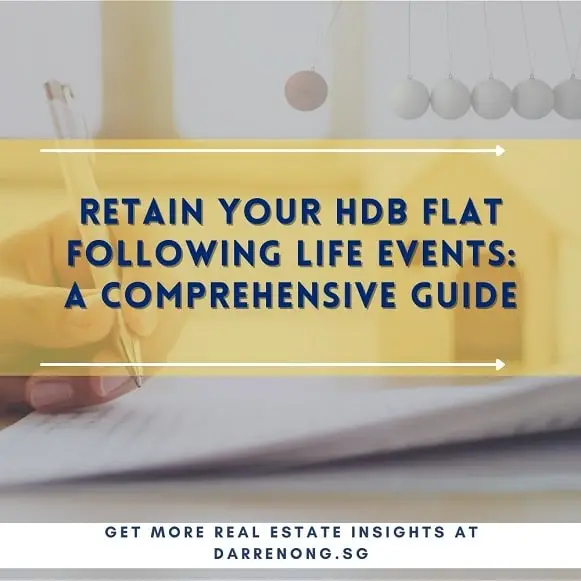Table of Contents
Retain Your HDB Flat Following Life Events: A Comprehensive Guide For HDB Inheritance
Owning an HDB flat in Singapore provides a roof over your head, financial security, and stability. However, life is full of significant changes, and certain events can potentially affect your ability to keep your flat. Major life milestones like the demise of a co-owner, divorce, marriage, or even a change in citizenship status can bring about complexities in HDB ownership. Navigating these transitions requires understanding HDB’s rules and regulations to ensure you can retain your flat without legal complications.
Whether you’re dealing with the unfortunate demise of a loved one, undergoing a divorce, or facing changes in your personal or citizenship status, your HDB flat does not have to be another source of stress. For many Singaporeans, their flat is not just a home but a lifelong investment. Understanding how to retain it after key life events is crucial to protecting this valuable asset.
This article will discuss how different life events impact HDB flat ownership and what steps you can take to ensure continued ownership. We’ll cover scenarios such as the passing of a joint owner or sole owner, divorce, annulment of marriage, changes in citizenship or permanent residency, and even the implications when a child moves out or you later get married.
Each situation comes with its own set of HDB regulations and requirements. By understanding these rules, you can be better prepared to make informed decisions and retain your HDB flat through any life transition. This guide aims to clarify these issues, ensuring you know and know how to manage these changes effectively and safeguard your home in the process.
- Demise of a Joint Owner
- Demise of a Sole Owner or Tenant-in-Common
- Divorce Case
- Annulment of Marriage or Break Up of Fiancé and Fiancée
- Loss of Citizenship or Singapore Permanent Resident (SPR) Status
- Child Moving Out Due to Marriage
- Owner Who Later Gets Married
- Summary and Conclusion
- Frequently Asked Questions
Demise of a Joint Owner: Ensuring a Smooth Transition of Ownership

The death of a joint owner of an HDB flat can be emotional and challenging, but understanding the necessary legal procedures can help ensure a smooth transition of ownership. When a joint owner passes away, the surviving co-owner(s) automatically inherit the deceased’s flat share under a joint tenancy arrangement. This automatic transfer of ownership is due to the right of survivorship, which means the remaining owner(s) take full control of the property without needing a will or probate process.
However, the surviving owner(s) must ensure the HDB flat formal ownership records are updated. Thus, a Notice of Death must be lodged with the Singapore Land Authority (SLA) to officially transfer the deceased’s share to the surviving owner(s). This step is crucial to ensure that the legal record reflects the correct ownership and that the surviving owner(s) can exercise full rights over the property.
Eligibility to Retain the Flat
To retain full ownership of the flat, the surviving joint owner must meet HDB’s eligibility requirements, which include:
- Being a Singapore Citizen (SC) or Singapore Permanent Resident (SPR).
- Being at least 21 years old.
- Meeting HDB’s eligibility conditions for flat ownership, which vary based on the specific purchase scheme of the flat.
For example, if a husband and wife co-own an HDB flat, and the husband passes away, the widowed wife can take over the flat as the sole owner, provided she meets these eligibility requirements. Once eligibility is confirmed, she must lodge the Notice of Death with the SLA to update the records officially.
Lodging a Notice of Death: How It Works
There are several ways to lodge a Notice of Death:
- Personally lodge it at the SLA.
- Engage a solicitor to lodge it on behalf of the surviving owner.
- Use HDB’s legal services by working with the managing HDB Branch of the flat.
Whichever option you choose, you need to submit the following documents to facilitate the process:
- Identity cards of the surviving joint owner(s).
- Original death certificate of the deceased owner.
- Proof of estate duty clearance if the death occurred before February 15, 2008.
- The duplicate lease, if one exists.
You need to pay the submission’s registration and conveyancing fees and the necessary documents.
After you have lodged the Notice of Death, the HDB’s Legal Group will prepare the necessary paperwork and inform the surviving joint owner(s) when they need to sign the relevant documents. This signing typically takes place at the HDB Branch managing the flat. The surviving owner(s) gain full rights to the flat by completing and formalizing the ownership transfer process.
Understanding Joint Tenancy vs. Tenancy-in-Common
It’s crucial to understand that the above procedures apply to flats owned under joint tenancy, where the right of survivorship takes effect. On the other hand, if the flat is under a tenancy-in-common arrangement, the deceased owner’s share doesn’t automatically go to the surviving co-owner. Instead, it becomes part of the deceased’s estate and is distributed based on their will. If without a will, Singapore’s intestacy laws determine the distribution. In these situations, probate might be necessary, and the surviving owner may need to negotiate with the beneficiaries of the deceased.
Suppose the surviving owner under a tenancy-in-common wishes to own the flat fully. In that case, they may be able to buy out the deceased’s share, provided they meet the HDB eligibility criteria for flat ownership. However, this process may involve more legal procedures than joint tenancy.
Conclusion: Demise of a Joint Owner: Ensuring a Smooth Transition of Ownership
While the demise of a joint owner can be a difficult time, having a clear understanding of the steps involved in transferring HDB flat ownership can ease the process. Whether the flat is held under a joint tenancy or tenancy-in-common arrangement, knowing how to lodge a Notice of Death and meet the necessary legal requirements will ensure that the surviving owner(s) can retain the property and continue to enjoy their home.
Demise of a Sole Owner or Tenant-in-Common: What Happens to the HDB Flat?
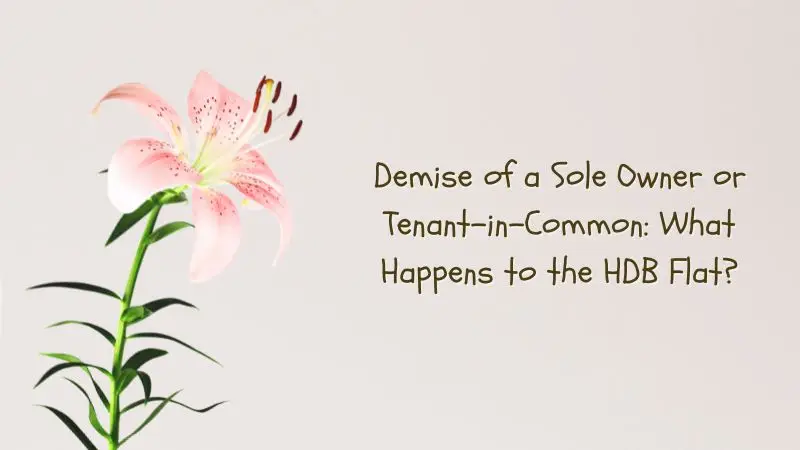
When the sole owner or a tenant-in-common of an HDB flat passes away, specific legal steps are required to handle and determine how their share of the property will distributed. Usually, the beneficiary or the immediate family member initiates the legal steps. Unlike joint tenancy, where ownership automatically passes to the surviving co-owner(s), the distribution of the share of a flat owned solely or under tenancy-in-common is according to the deceased owner’s will. If there is no will, the Intestate Succession Act governs the process. This legal procedure can be more complicated and usually requires the court’s involvement to distribute the deceased’s estate properly.
Legal Process for Ownership Transfer
When the deceased owner has left a will, the HDB flat’s ownership is distributed based on the will’s instructions. However, if there is no will, the Intestate Succession Act dictates how the estate should be divided among the surviving family members. In both cases, surviving family members must obtain legal authority from the court to manage and distribute the deceased’s estate.
To proceed with the distribution, the deceased’s family must apply for a court order, either a Grant of Letters of Administration, if no will, or a Grant of Probate, if there is a will, which provides legal authority to manage the estate. The process requires the involvement of a solicitor, as court orders are necessary to handle the transfer of ownership of the flat.
Eligibility to Retain the Flat
As the remaining family member or single occupier, you may retain ownership of the flat provided you meet certain eligibility criteria:
- You must be a Singapore Citizen (SC) or Singapore Permanent Resident (SPR).
- You must be at least 21 years old.
- You must comply with HDB’s eligibility conditions for flat ownership.
Once the court grants legal authority, either through a Letters of Administration or a Grant of Probate, the estate’s Executor, if there is a will, or the estate’s Administrator, if there is no will, can manage the deceased’s interest in the flat and proceed with the transfer of ownership.
If There Is a Will: Steps for Distribution
In cases where the deceased owner has a will, the process follows the wishes outlined in the document. The estate’s Executor, the person named in the will to manage the deceased’s estate, is responsible for distributing the property.
Required Documents:
- Grant of Probate: The family should engage a private solicitor to apply for this court order, which provides the Executor with legal authority to manage and distribute the deceased’s estate, including the HDB flat.
- The original copy of the deceased’s will must be present.
- The Syariah Court Inheritance Certificate (for Muslim estates).
- The deceased’s death certificate.
- The Identity cards of the beneficiaries and Executor(s) must be present.
- The Duplicate lease of the deceased’s flat, if any
Once the Executor obtains the Grant of Probate, they can transfer the flat to the named beneficiaries, provided they meet HDB’s eligibility rules.
If There Is No Will: Distribution Under Intestate Succession Act
If the deceased owner did not leave a will, their interest in the flat will be distributed following the Intestate Succession Act. The Administrator, appointed by the court through the Grant of Letters of Administration, will manage the estate. This individual is typically a close family member, such as a spouse or child.
Required Documents:
- Grant of Letters of Administration: The family member of the deceased should engage a private solicitor to apply for this court order, giving legal authority to the Administrator to manage and distribute the deceased’s estate.
- The original copy of the deceased’s will must be present.
- The Syariah Court Inheritance Certificate (for Muslim estates).
- The Duplicate lease of the deceased’s flat, if any
- The Identity cards of all relevant parties (Administrator and beneficiaries) must be present.
Once the Grant of Letters of Administration is secured, the Administrator can distribute the flat according to the intestacy laws and transfer ownership to the rightful beneficiaries.
Registering Legal Rights as Administrator or Executor
After obtaining either the Grant of Letters of Administration or Grant of Probate, the Executor or Administrator must register their legal right to manage the flat by engaging their solicitor or opting for HDB’s legal services. The Executor or Administrator can do the latter by approaching the HDB Branch managing the flat.
Required Documents for Registration:
- The original Grant of Probate and Will or Grant of Letters of Administration.
- The Syariah Court Inheritance Certificate (for Muslim estates).
- A copy of the deceased’s death certificate.
- The Identity cards of all flat owners, Administrators, or Executors.
- The duplicate lease of the flat, if any.
At this point, the Administrator or Executor will need to sign the relevant documents and pay any necessary fees, including stamp duty and conveyancing fees, to complete the legal transfer of ownership.
Final Transfer to Beneficiaries
Once the legal steps are completed, the flat will be transferred to the beneficiaries named listed in the will or, in the absence of a will, the rightful heirs under the Intestate Succession Act. These beneficiaries must still meet HDB’s eligibility criteria to take over the flat. If they cannot retain the flat, they may be required to sell it according to HDB’s regulations.
Conclusion: Demise of a Sole Owner or Tenant-in-Common: What Happens to the HDB Flat?
Transferring ownership of an HDB flat following the demise of a sole owner or tenant-in-common can be complex, involving legal procedures, court orders, and HDB’s eligibility rules. It is crucial for surviving family members or co-owners to engage a solicitor, follow the required legal steps, and ensure compliance with HDB’s rules to retain the flat and ensure a smooth ownership transition.
Divorce Case: What Happens to Your HDB Flat?
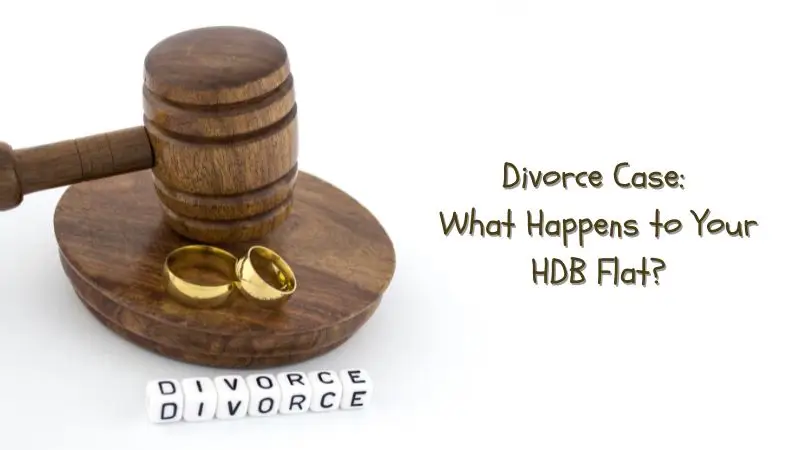
Divorce often brings complex decisions, particularly regarding shared assets like your HDB flat. The division of the flat during a divorce depends on various factors, including whether you have children, your eligibility to retain the flat under HDB’s rules, and whether you have fulfilled the Minimum Occupation Period (MOP). In Singapore, the Family Justice Courts may also play a role in deciding the division of matrimonial assets.
This section explains what happens to your HDB flat in the event of a divorce, with different scenarios based on whether children are involved and whether you fulfilled the MOP.
Divorced With Children
If you have custody of your child or children (including care and control), you are eligible to retain the flat after a divorce, provided that you meet certain conditions. For example, to keep the flat, you must satisfy HDB’s eligibility criteria, which require that the divorce must not be due to non-consummation of the marriage or annulment. In cases where the custodial parent wishes to retain the flat, they may do so under the Public Scheme as long as the other conditions are fulfilled.
For example, if a mother retains custody of her child after the divorce, she may take over the flat as a sole owner or co-own it with family members. This way, the child can continue living in the flat, providing stability after the divorce.
Divorced Without Children
Retaining the flat becomes slightly more complicated if there are no children from the marriage. But you may still be able to retain the HDB flat under the HDB Single Singapore Citizen (SSC) Scheme if you meet specific conditions. To qualify, you must:
- Be a Singapore Citizen.
- Be at least 35 years old.
- Meet the prevailing eligibility criteria under the SSC scheme.
This scheme allows eligible singles to retain the flat without needing a co-owner, providing them with continued housing security post-divorce.
Alternatively, suppose you need to meet the SSC criteria or are under 35. In that case, you may still be able to retain the flat by including another eligible person, such as a family member, under a suitable HDB scheme. Including another person must comply with HDB’s prevailing rules, and both parties must meet the eligibility conditions for co-ownership.
Completion of Minimum Occupation Period (MOP)
The Minimum Occupation Period (MOP) is critical when deciding whether to sell or retain the flat post-divorce. The MOP typically requires the owner(s) to occupy the flat for at least five years before selling it on the open market. If the MOP has been satisfied by the time of divorce completion, both parties can sell the flat in the open market and split the proceeds according to the divorce settlement terms or court order.
However, if the MOP has not been satisfied and neither party is eligible to retain the flat, it cannot be sold on the open market. In such cases, you may need to return the flat to HDB. HDB will assess whether they can take the flat back and, if so, determine the appropriate compensation for it. This option ensures fair compensation for both parties while adhering to HDB’s ownership rules.
Transfer of Ownership
If one party is eligible to retain the flat, they may also opt to buy out the other party’s share. The party keeping the flat must meet the eligibility conditions and secure financing to purchase the other’s share, subject to the Family Justice Courts and HDB approval.
The decision of who retains the flat often depends on factors such as custody of children, financial capacity, and court rulings on the division of matrimonial assets. The Family Justice Courts consider both parties’ contributions to the purchase and maintenance of the flat and the housing needs of both individuals post-divorce.
Conclusion: Divorce Case: What Happens to Your HDB Flat?
Divorce brings numerous changes, and handling an HDB flat can be one of the most complex aspects. Whether you have children, meet the eligibility requirements, or have fulfilled the MOP will all play a role in determining whether the flat is retained, sold, or returned to HDB. Understanding your rights and obligations under HDB’s guidelines and to seek a professional advice to ensure a smooth and fair resolution of flat ownership post-divorce is crucial.
Annulment of Marriage or Break Up of Fiancé and Fiancée: Understanding Your Options for HDB Flat Ownership
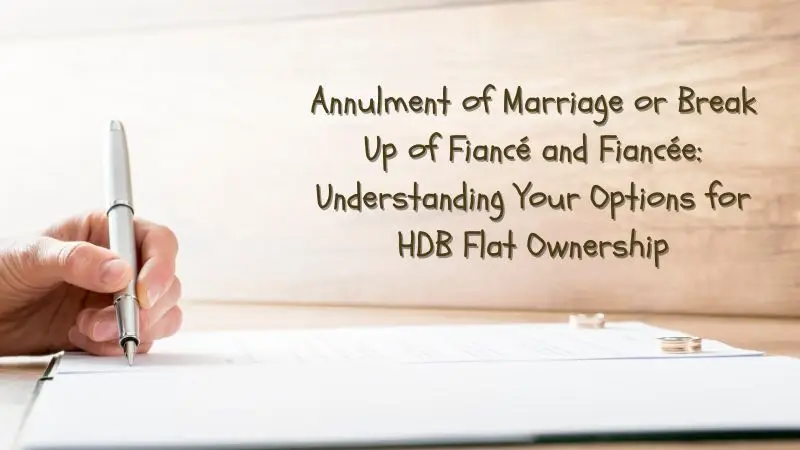
The annulment of a marriage or the breakup of a fiancé-fiancée relationship can present significant challenges when it comes to HDB flat ownership, especially if the flat was purchased by both parties under the Fiancé-Fiancée Scheme. Whether either party can retain the flat depends on various factors, including eligibility rules and whether any parents were listed in the original flat application. Understanding these rules can help ensure a smoother process during what is already a difficult time.
Eligibility to Retain the Flat
In the event of an annulment of marriage or the breakup of a fiancé-fiancée relationship, neither party is typically allowed to retain the HDB flat if the marriage has not been consummated or completed. However, flat retention may be possible under certain conditions, such as if either party’s parents were initially listed in the flat application. This would allow the flat to be retained under a valid family nucleus, subject to HDB’s approval and eligibility criteria.
Suppose neither party qualifies for retention of the flat. In that case, the flat may have to be returned to HDB, and compensation will be provided at the prevailing market value, subject to approval. It is important to recognize that HDB’s eligibility assessment will determine whether any parties involved can retain the flat.
Impact of Annulment of Marriage on HDB Flat Ownership
An annulment legally voids the marriage, which means the marriage is considered to have never existed. This can lead to complications for HDB flats purchased under the Public Scheme. In annulment cases due to non-consummation of marriage, HDB does not allow either party to retain the flat unless exceptional circumstances apply, such as if one of the parents was included in the original flat application. If no one is eligible to retain the flat, it must be returned to HDB, and HDB will determine a compensation amount based on HDB’s prevailing compensation prices.
Breakup of Fiancé and Fiancée Under the Fiancé-Fiancée Scheme
For couples who purchased an HDB flat under the Fiancé-Fiancée Scheme, the breakup of the relationship before marriage can result in the cancellation of the flat application. Under this scheme, couples are required to marry before collecting the keys to the flat. Suppose the relationship ends before the marriage takes place. In that case, neither party will be allowed to retain the flat unless one of the parties has a parent listed in the original application.
In the absence of this eligibility, the flat must be returned to HDB, with compensation provided according to the flat’s market value at the time. This rule ensures that flats purchased under the Fiancé-Fiancée Scheme are only retained by valid family units or married couples.
Assessment of Eligibility to Retain the Flat
Suppose you are seeking an annulment of marriage; in that case, have your private solicitor handle the necessary paperwork, such as submitting an “Agreed Matrimonial Property” Plan or a “Standard Query” form to the HDB Branch office managing your matrimonial flat. This allows HDB to assess your eligibility to retain the flat based on your family situation and the specific conditions of your case.
This assessment will determine whether you can retain the flat or must return to HDB. Ensuring all required legal documentation is submitted on time will help facilitate the process and clarify the next steps.
Conclusion: Annulment of Marriage or Break Up of Fiancé and Fiancée: Understanding Your Options for HDB Flat Ownership
Navigating HDB flat ownership during the annulment of a marriage or the breakup of a fiancé and fiancée can be complex, and eligibility to retain the flat is often contingent on whether either party’s parents were listed in the original application. Returning the flat to HDB and receiving compensation may be the only option in cases where retention is impossible. Ensuring you understand HDB’s rules, meet eligibility criteria, and submit the necessary documents through your solicitor will help ensure a smoother process during these challenging circumstances.
Loss of Citizenship or Singapore Permanent Resident (SPR) Status: Implications for HDB Flat Ownership
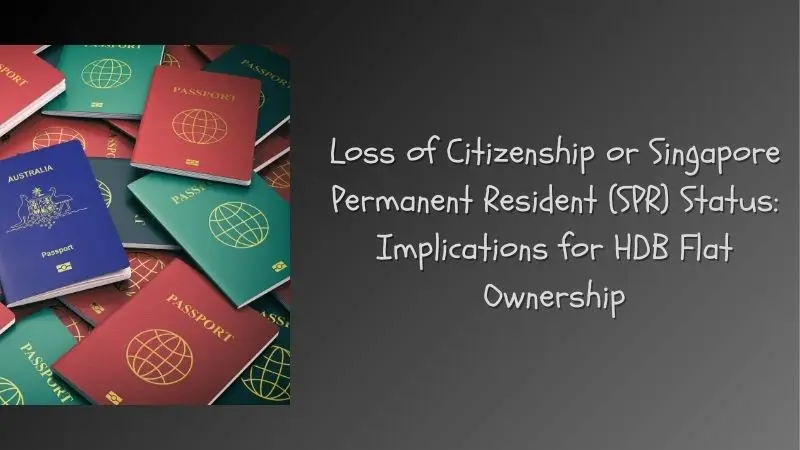
In Singapore, owning an HDB flat is a privilege available only to Singapore Citizens (SC) and Singapore Permanent Residents (SPR) under specific eligibility criteria. However, if a flat owner or co-owner loses their Singapore citizenship or SPR status, it can lead to significant consequences regarding retaining their HDB flat. Understanding the regulations surrounding the loss of citizenship or SPR status is essential to ensure compliance with HDB’s rules.
Impact of Losing Singapore Citizenship or SPR Status
If you lose your Singapore citizenship or Permanent Resident (PR) status, you will no longer meet the eligibility requirements to own an HDB flat. In such cases, HDB typically requires you to dispose of the flat by selling it on the open market, provided you have met the Minimum Occupation Period (MOP). The MOP is usually five years, during which the owners must occupy the flat before they are allowed to sell it. If you fulfill the MOP, you can sell the flat to eligible buyers on the open market.
However, if you haven’t fulfilled the MOP, you may be required to return the flat to HDB. In such cases, HDB will assess the flat’s condition and determine an appropriate compensation amount based on the prevailing market price and the terms of the flat’s ownership.
Loss of Citizenship for Joint Owners
Suppose the flat is co-owned; only one owner loses their citizenship or SPR status while the other remains eligible. In that case, the remaining eligible owner may retain the flat, provided they meet HDB’s requirements. In this case, the person who retains their Singapore Citizen or Permanent Resident status can continue living in the flat or apply to buy out the owner’s share who lost eligibility. The co-owner may also include another eligible family member under one of HDB’s ownership schemes to form a valid family nucleus, which is required to retain the flat.
It is important to note that the loss of eligibility due to citizenship or PR status changes can also affect the type of flat you are allowed to own. For example, non-citizens and non-PRs cannot own public housing like HDB flats.
Steps to Take After Loss of Citizenship or SPR Status
If you or your co-owner lose your citizenship or PR status, the first step is to notify HDB of the change. HDB will assess the situation and guide how to proceed. Depending on the circumstances, the flat may need to be sold or returned, and you must comply with HDB’s regulations to avoid penalties or legal complications.
- Sell the flat on the open market if you’ve met the MOP.
- Return the flat to HDB if the MOP is not satisfied.
- Buy out the share of the co-owner who lost their status if one owner remains eligible to retain the flat.
It’s advisable to engage a solicitor or seek professional guidance to handle the legal aspects of the transaction, especially if there are co-ownership issues or complex financial arrangements involved.
Conclusion: Loss of Citizenship or Singapore Permanent Resident (SPR) Status: Implications for HDB Flat Ownership
The loss of Singapore citizenship or PR status seriously impacts HDB flat ownership. Whether it results in selling the flat on the open market or returning it to HDB, it’s important to act quickly and follow the required steps to avoid complications. If one co-owner remains eligible, they may be able to retain the flat by buying out the share of the ineligible owner. Understanding the legal and procedural requirements is key to ensuring compliance with HDB regulations and safeguarding your housing situation.
Child Moving Out Due to Marriage: Impact on HDB Flat Ownership
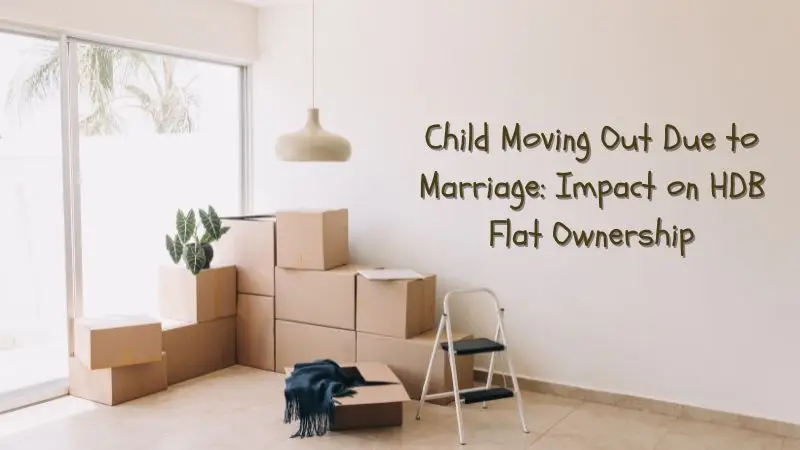
When a child moves out of the family HDB flat due to marriage, the ownership structure of the flat may change depending on whether the child was listed as a co-owner. Understanding how the departure of a co-owner affects the flat is crucial, especially in maintaining eligibility for continued ownership or adjusting the flat’s ownership to comply with HDB regulations.
Ownership Implications of a Child Moving Out
If your child was listed as a co-owner of the HDB flat and moves out to form their own household after marriage, there may be implications for the remaining owners. The HDB flat’s ownership structure needs to be updated, and the flat may need to be transferred to the remaining co-owners. If the child no longer lives in the flat, they must remove themselves as co-owners and transfer their share to the remaining family members, such as the parents.
In most cases, the parents or the remaining family members can continue owning the flat, provided they meet HDB’s eligibility criteria for retaining the flat, such as the family nucleus requirement and citizenship or permanent resident status. This ensures that the flat remains within the family and its ownership is structured correctly even after the child has moved out.
Child Moving Out Due to Marriage and Forming Their Own Household
If the child who is moving out has married and is forming their own household, they may be eligible to purchase their own HDB flat under HDB’s various schemes. The child and their spouse can apply for a flat under the Public Scheme or other schemes designed for newlyweds. If the child was previously a co-owner of the family flat, they must relinquish their ownership before applying for their own HDB flat.
This is because HDB regulations do not allow individuals to own two HDB flats concurrently. Therefore, once the child decides to move out and form their own family, they must either transfer their share of the family flat to the remaining owners or sell their portion if applicable.
Transfer of Ownership Process
If the child needs to transfer their ownership of the family flat, the process involves submitting an ownership transfer application to HDB. This includes documents such as identity cards, marriage certificates, and a declaration of transfer. The process also requires both parties (the departing child and the remaining owners) to agree on the terms of the transfer.
Once the application is approved, the child is no longer considered a co-owner after transferring the flat’s ownership to the remaining family members. Financial arrangements may sometimes be needed to compensate the departing co-owner for their share of the flat, depending on the family’s agreements and circumstances.
You may read more detail here >> about Change in Flat Ownership.
Eligibility to Retain the Family Flat
For the remaining family members to retain the flat, they must meet HDB’s eligibility criteria, which include:
- Having a valid family nucleus, such as a parent-child or husband-wife relationship.
- The remaining owner(s) must be Singapore Citizens (SC) or Singapore Permanent Residents (SPR).
- Fulfilling the Minimum Occupation Period (MOP) by the owner if the flat is being sold or transferred.
These conditions ensure that the flat remains under legal ownership and continues to fulfill HDB’s public housing policies.
Conclusion: Child Moving Out Due to Marriage: Impact on HDB Flat Ownership
When a child moves out of the family flat due to marriage, it’s essential to review the ownership structure of the HDB flat to ensure compliance with HDB regulations. Whether the child transfers ownership to the remaining family members or relinquishes their co-ownership before purchasing their own flat, understanding the process and meeting the necessary eligibility criteria will help ensure that the flat remains within the family and avoids any legal complications.
Owner Who Later Gets Married: Adjusting HDB Flat Ownership and Adding Your Spouse
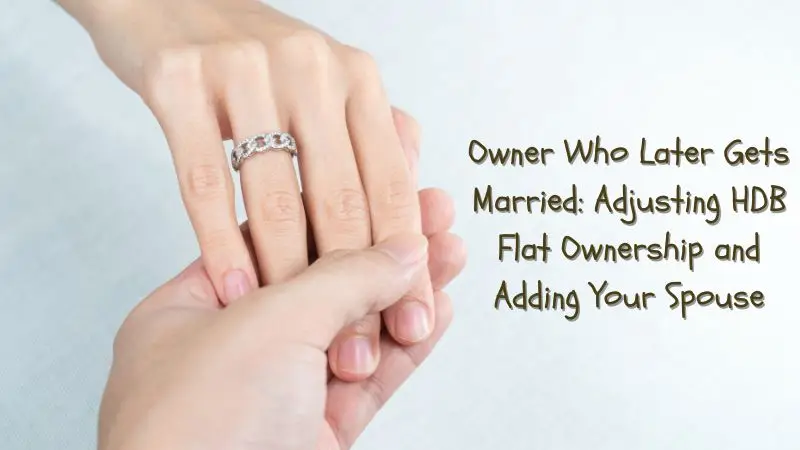
If you purchased your HDB flat as a single individual and later married, you must change the ownership to include your spouse. HDB regulations require that married couples, considered a single-family unit, can only own one HDB flat at any time. Depending on your situation, your spouse must be added to your flat as either a co-owner or an essential occupier. Understanding how to adjust your flat’s ownership and meet HDB’s requirements is necessary for maintaining compliance with public housing policies.
Adding Your Spouse as a Co-owner or Occupier
Upon marriage, if you were the sole owner of your HDB flat before marriage, your spouse must be listed as a co-owner or occupier. This ensures that the flat reflects your status as a family unit and that you and your spouse fulfill HDB’s eligibility conditions for flat ownership. If your spouse is added as a co-owner, they will share legal ownership of the flat and its responsibilities. If your spouse is added as an essential occupier, they do not hold legal ownership but are recognized as part of the household, fulfilling HDB’s criteria for the family nucleus.
This is an important step, as HDB regulations do not allow couples to own more than one HDB flat. Therefore, you and your spouse must be in the same flat as co-owners or occupiers to comply with the ownership restrictions. Failing to update the flat’s ownership structure after marriage could result in legal complications, especially if either party owns or intends to purchase another property.
Application Procedures for Adding a Spouse
You must follow the ownership transfer application process with HDB to add your spouse as a co-owner or occupier. This involves submitting relevant documents, such as:
- Marriage certificate.
- Identity cards of both parties.
- Any other documents HDB may require to process the application.
Once the application is approved by HDB, your spouse will officially be listed as either a co-owner or occupier of the flat, and the HDB will update the ownership structure in HDB’s records.
If your spouse is added as an essential occupier, they will not have legal ownership of the flat. Still, they will be considered a necessary part of the household to meet the family’s nucleus requirements. This status allows both parties to fulfill HDB’s flat ownership rules without affecting the ownership of other properties.
Selling or Renting Out the Flat After Marriage
Once you and your spouse have fulfilled the MOP, you can sell your flat on the open market, rent out the entire flat, or invest in private property. However, if the MOP has not been met, HDB’s restrictions will still apply, and neither you nor your spouse can engage in any activities that could violate the MOP rules.
It’s also worth noting that should you choose to invest in private property after fulfilling the MOP, and certain restrictions will still apply, such as needing to wait for five years before purchasing a private property without incurring additional taxes or penalties under Singapore’s property regulations.
Conclusion: Owner Who Later Gets Married: Adjusting HDB Flat Ownership and Adding Your Spouse
When an HDB flat owner later gets married, updating the ownership structure to include the spouse as a co-owner or occupier is important, ensuring compliance with HDB’s housing policies. By adding your spouse to the flat, fulfilling the Minimum Occupation Period (MOP), and adhering to HDB’s regulations, you can maintain ownership and manage your housing needs without legal complications. Always be mindful of public housing rules, as they ensure that flats remain accessible to those in need and serve their intended purpose.
Summary and Conclusion: Safeguarding Your HDB Flat Through Life Events
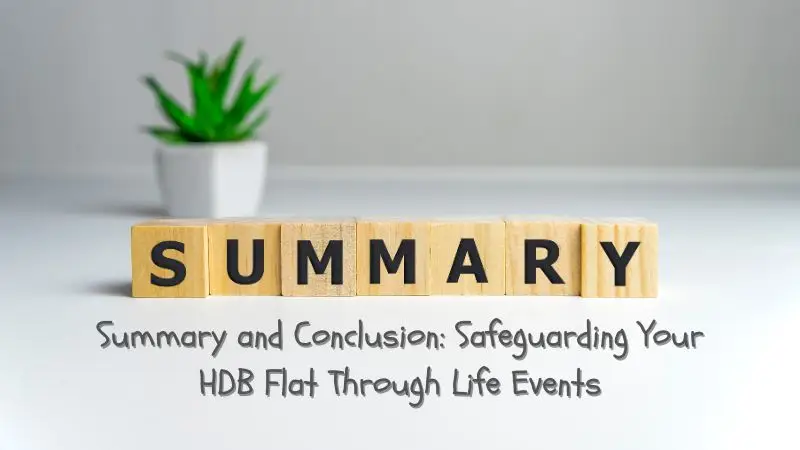
Owning an HDB flat in Singapore is a significant milestone for many individuals and families. However, life is full of changes, and events such as marriage, divorce, death, or changes in citizenship can affect your eligibility to retain your flat. Understanding how to navigate these transitions while ensuring that your HDB flat is retained, sold, or transferred by HDB’s regulations is crucial for maintaining housing stability.
In cases of demise of a joint owner, the surviving owner(s) can retain the flat by lodging a Notice of Death and ensuring all HDB conditions are met. For sole owners or tenants-in-common, the flat is distributed according to a will or the Intestate Succession Act, and legal procedures, including probate, must be followed to transfer ownership. Similarly, divorce cases often require one party to either buy out the other or sell the flat, depending on whether children are involved and if HDB’s Minimum Occupation Period (MOP) has been met.
Retaining the flat can be more complicated for marriage annulments or breakups of fiancé-fiancée relationships, especially if neither party is eligible. In such cases, the flat may need to be returned to HDB, subject to compensation based on market value. Additionally, suppose a flat owner experiences the loss of citizenship or Singapore Permanent Resident (SPR) status. In that case, they may no longer be eligible to own the flat, requiring them to sell it or transfer ownership to an eligible co-owner.
Life events such as children moving out due to marriage or an owner who later gets married can also necessitate changes in the flat’s ownership structure. Whether adding a spouse as a co-owner or transferring ownership to the remaining family members, ensuring compliance with HDB’s regulations is important to avoid legal complications.
Navigating HDB Rules and Regulations
Understanding and adhering to HDB’s rules and regulations is key to protecting your home throughout these life events. Each situation comes with its own set of eligibility requirements, legal processes, and decisions regarding whether to retain, transfer, or sell the flat. Fulfilling the Minimum Occupation Period (MOP) is often a central consideration, particularly when considering selling a flat or purchasing private property.
Final Thoughts
Whether it’s a significant life change like marriage, divorce, or the loss of a family member, your HDB flat does not need to be an additional source of stress. By understanding the eligibility criteria, keeping up with legal procedures, and complying with HDB regulations, you can safeguard your HDB flat and secure your housing future. Always consult with legal professionals or HDB for guidance to ensure that your rights as a flat owner are protected and that any transitions are handled smoothly and in accordance with the law.
I hope the sharing of this article benefited you in some way.
Frequently Asked Questions About HDB Inheritance
Can I inherit and retain an HDB flat if I own private property?
Can I Inherit and retain an HDB flat if I own private property?
If you own private property, you can inherit and retain the inherited HDB flat if:
- The deceased purchased the HDB flat before 30th August 2010 without government subsidies (Housing Grant).
- You do not own another HDB flat; otherwise, you must sell one of the HDB flats within 6 months because HDB rules do not allow you to own two HDB flats simultaneously.
- The deceased fulfilled the Minimum Occupation Period (MOP).
- You must meet one of the HDB’s eligibility scheme requirements.
If you own private property (not selling it), you can inherit but cannot retain the inherited HDB flat and might need to sell it within 6 months from the date you took over the ownership if:
- The deceased purchased the HDB flat with government subsidies (Housing Grant) before 30th August 2010.
- The deceased purchased the HDB flat with or without government subsidies (Housing Grant) after 30th August 2010.
- You do not meet one of the HDB’s eligibility scheme requirements.
- You own another HDB flat and decided to keep your own HDB flat.
- The deceased did not fulfill the Minimum Occupation Period (MOP).
- You are a Singapore PR / Foreigner household.
How does the HDB Minimum Occupation Period (MOP) affect me from inheriting an HDB flat?
How does the HDB Minimum Occupation Period (MOP) affect me from inheriting an HDB flat?
The HDB Minimum Occupation Period (MOP) is the duration the owner(s) need to physically occupy/stay in their flat before they can/are eligible to sell it in the open market.
The MOP duration for different types of flats is available on the HDB website. It ranges between 5 and 10 years or 20 years for Fresh Start Housing Scheme.
If the MOP is fulfilled, you can sell the inherited HDB flat. However, if the MOP isn’t fulfilled, you, as the beneficiary, need to continue to fulfill the MOP before you can sell the inherited HDB flat. Alternatively, you need to contact HDB for assistance on the next course of action (appeal) to sell the inherited HDB.
If I own an HDB Flat, can I inherit and retain another HDB Flat?
If I own an HDB flat, can I inherit and retain another HDB flat?
You can inherit and may retain the inherited HDB Flat if
- Your current HDB Flat fulfilled the HDB flat MOP, and
- You must sell your existing HDB Flat within 6 months from the date you took over ownership because HDB rules do not allow anyone to own two HDB flats concurrently and
- You must also fulfill the HDB eligibility conditions, such as citizenship, age, and family nucleus requirements.
If I own an HDB Flat, can I inherit and retain private property (Non-Landed Property) in Singapore?
If I own an HDB flat, can i inherit and retain private property (Non-Landed) Property) in Singapore?
You can inherit and may retain the inherited non-landed private property in Singapore if
- you fulfilled your HDB flat MOP, and
- You meet the HDB’s eligibility requirement, which requires you to be a Singaporean and a deceased family member.
Otherwise, you need to sell one of the properties if you cannot fulfill the above two conditions.
Can I inherit a landed property if i'm not a Singapore Citizen?
Can I inherit a landed property if i'm not a Singapore Citizen?
Landed property referred to residential property that has its own title to the land. As a non-Singapore citizen, you need to get approval from the Land Dealings Approval Unit (LDAU) of the Singapore Land Authority (SLA) to own a landed property.
The approval will likely be given if you have been a Singapore PR for at least 5 years and you have made an exceptional economic contribution to Singapore.
Is inherited property counted as one property count to determine ABSD?
Is inherited property counted as one property count to determine ABSD?
Yes, inherited property contributed to a property count under your name. Thus, if you decide to purchase another property, ABSD will be payable.
Example:
If you do not own a property now but have inherited one from your parents, the property count under your name is 1. Thus, when you buy another property, it is considered the second property, and ABSD is payable.
Do I have to pay Stamp Duty or ABSD for my inherited property?
Do I have to pay Stamy Duty or ABSD for my inherited property?
If the residential property is inherited through a Will or the Intestate Succession Act (no Will), or the Administration of Muslim Law Act, you do not need to pay Buyer’s Stamp Duty (BSD). The Additional Buyer’s Stamp Duty (ABSD) is also not payable, even if you own more than one property.
Otherwise, the property may be considered a gift or a sale, for which you may incur stamp duties.
If you sell the inherited property, which the deceased bought after 20 Feb 2010, within 3 years of acquiring it, you need to pay Seller’s Stamp Duty (SSD), depending on when you sell it. The SSD payable is 12% if you sell it in the first year, 8% in the second year, and 4% in the third year.
Do I have to pay inheritance tax or estate duty in Singapore?
Do I have to pay inheritance tax or estate duty in Singapore?
The inheritance tax, also known as estate duty, has been removed for deaths on and after 15th February 2008. Thus, you do not need to pay such tax if the benefactor passes away on or after 15th February 2008.
What other Taxes or Fees do I need to pay when I inherit the property?
What other Taxes or Fees do I need to pay when I inherit the property?
If you inherit a private condominium or apartment, you need to take over and pay the property’s monthly maintenance fee and sinking fund, if any.
If you inherit an HDB flat, you need to take over and pay the monthly Service & Conservancy Charges (S&CC) to the respective Town Council.
Besides the above fees, you must also pay the property tax on the inherited property.
Do I need to take over the mortgage if the property has an ongoing mortgage?
Do I need to take over the mortgage if the property has an ongoing mortgage?
If the HDB is insured under the Home Protection Scheme (HPS), the outstanding home loan will be automatically paid off by the CPF board. Thus, the beneficiary will not inherit the home loan.
If the private property is insured by Mortgage Reducing Term Assurance (MRTA), the insurance company will pay off the outstanding home loan.
In case HPS or MRTA does not insure the property, and there are outstanding mortgages where the deceased was the sole borrower, you are not legally liable for the mortgage. The Administrator or the Executor can put up the property for Sale and repay the outstanding mortgage before the remaining proceeds from the Sale are distributed among the listed beneficiaries.
If you are allowed to take over the remaining mortgage, you need to note that the Total Debt Servicing Ratio (TDSR) will apply, and the bank will use TDSR to assess whether you have the income capability to do so.
Can I apply for a new HDB Flat or purchase a resale HDB flat if I inherited a private property?
Can I apply for a new HDB flat or purchase a resale HDB flat if I inherited a private property?
If you inherit a private property and want to apply for a new HDB flat, you must sell the inherited private property and wait 30 months before applying for the new HDB flat.
A new HDB flat means it is either a Built-To-Order BTO Flat, a Sale-of-Balance SOB Flat, or an Open Booking of a Flat directly from an HDB sale.
On the other hand, if you inherit a private property but plan to buy a resale HDB flat, you need to sell the private property and wait for a 15-month wait-out period before you buy the resale flat.
Can a minor inherit an HDB Flat?
Can a minor inherit an HDB flat?
A minor can inherit an HDB flat through a Will or Intestate Succession Act if there is no will. However, a minor under 21 years old does not have the legal capacity to contract in the Sale and purchase of any land or property. Thus, the surviving parent or guardian named in the Will may manage the minor’s inheritance until the minor turns 21 years old.
As such, the HDB flat may be held on trust by the Executors or Administrators of the deceased’s estate.
If the HDB Flat owner dies without a Will, what will happen?
If the HDB flat owner dies without a Will, what will happen?
If there is no surviving owner(s) and no Will, the next of kin needs to apply Grant of Letters of Administration. This allows the Administrator to register their legal right to administer the deceased’s estate according to the Intestate Succession Act.
This is an important step to legally transfer the ownership of the flat to the Administrator, who will handle the estate matter for the deceased.
If the HDB Flat owner dies with a Will, what will happen?
If the HDB flat owner dies with a Will, what will happen?
Suppose there is no surviving owner(s), and a valid Will is in place. In that case, the Executor listed in the Will must file for a Grant of Probate to legally transfer the ownership of the flat and be authorized to handle and manage the distribution of the deceased’s estate according to the Will’s stipulations.
Need Real Estate Consultation?
Contact Me
Feel free to connect with me!
Senior Associate District Director
Huttons Asia Pte Ltd
CEA Registration No.: R026434F
Agency License: L3008899K
Contact: 93839588

